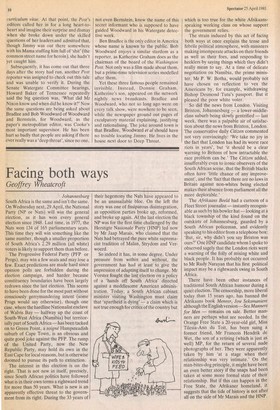Facing both ways
Geoffrey Wheatcroft
Johannesburg South Africa is the same and isn't the same. On Wednesday next, 29 April, the National Party (NP or Nats) will win the general election, as it has won every general election since 1948. Last time, in 1977, the Nats won 134 of 165 parliamentary seats. This time they will win something like the same number, though a smaller proportion of South Africa's 2.29 million (all white) voters is likely to support them than before.
The Progressive Federal Party (PFP or Frogs), may win a few seats and may lose a few. Exact predictions are made hard since opinion polls are forbidden during the election campaign, and harder because constituency boundaries have been largely redrawn since the last election. This seems to have been done for the most part without consciously gerrymandering intent (some Progs would say otherwise), though one case, where the hardline Nationalist enclave of Walvis Bay — halfway up the coast of South-West Africa (Namibia) but territorially part of South Africa— has been tacked on to Green Point, a soigné Hampsteadish suburb of Cape Town, is an obvious and quite good joke against the PFP. The rump of the United Party, now the New Republic Party, may hold its own in the East Cape for local reasons, but is otherwise doomed to pursue its path to extinction.
The interest in this election is on the right. That is not new in itself, precisely, since South African politics have followed what is in their own terms a rightward trend for more than 50 years. What is new is an apparently effective threat to the government from its right. During the 33 years of their hegemony the Nats have appeared to be an unassailable bloc. On the left the story was one of fissiparous disintegration, as opposition parties broke up, reformed, and broke up again. At the last election the NP was for the first time challenged by the Herstigte Nasionale Party (HNP) led now by Mr Jaap Marais, who claimed that the Nats had betrayed the pure white supremacist tradition of Malan, Strydom and Verwoerd .
So indeed it has, in some degree. Under pressure from within and without, the government has had at least to give the impression of adapting itself to change. Mr Vorster fought the last election on a policy of a 'hands off South Africa' directed against a meddlesome American administration. Today, a South African cabinet minister visiting Washington must claim that 'apartheid is dying' — a claim which is not true enough for critics of the country but which is too true for the white Afrikaansspeaking working class on whose support the government relies.
The strain induced by this act of facing both ways at once explains the tense and febrile political atmosphere, with ministers making intemperate attacks on their friends as well as their foes, and responding to hecklers by saying things which they didn't really mean to say. At a time of delicate negotiation on Namibia, the prime minister, Mr P. W. Botha, would probably not have chosen on reflection to vex the Americans by, for example, withdrawing Bishop Desmond Tutu's passport. But it pleased the poor white voter.
So did the news from London. Visiting Brixton, Johannesburg'a lower-middleclass suburb being slowly gentrified — last week, there was a palpable air of satisfaction about the news from Brixton, London. The conservative daily Citizen commented not very convincingly: 'We take no joy in the fact that London has had its worst race riots in years', but 'it should be a clear warning to Britons of how intractable the race problem can be,' The Citizen added, insufferably even to ironic observers of the South African scene, that the British blacks often have 'little chance of any improvement', and the 'fact that there are no laws in Britain against non-whites being elected makes their absence from parliament all the more deplorable.'
The Afrikaans Beeld had a cartoon of a Fleet Street journalist — instantly recognisable as such by his bowler hat looking at a black township of the kind found on the outskirts of Johannesburg, guarded by a South African policeman, and evidently speaking to his editor from a telephone box: 'But, sir, why didn't you say Brixton was ours?' One HNP candidate whom I spoke to observed sagely that the London riots were a warning of the folly of mixing white and black people. It has probably not occurred to Mr Rudy Narayan that his first political impact may be a rightwards swing in South Africa.
There have been other instances of traditional South African humour during a quiet election. The censorship, more liberal today than 15 years ago, has banned the Afrikaans book Meneer, Jou Seksmaniere although the English version—Sex Manners for Men — remains on sale. Better manners are perhaps what are needed. In the Orange Free State a 20-year-old girl, Miss Tilesia-Ann du Toit, has been suing a former friend, Mr Francois Hendrik de Wet, the son of a retiring (which is just as well) MP, for the return of several nude photographs of her. They were apparently taken by him 'at a stage when their relationship was very intimate.' On the man-bites-dog principle, it might have been an even better story if the snaps had been taken at some more formal state of their relationship. But if this can happen in the Free State, the Afrikaner homeland, it suggests that the tide of history is not after all on the side of Mr Marais and the HNP.


































 Previous page
Previous page